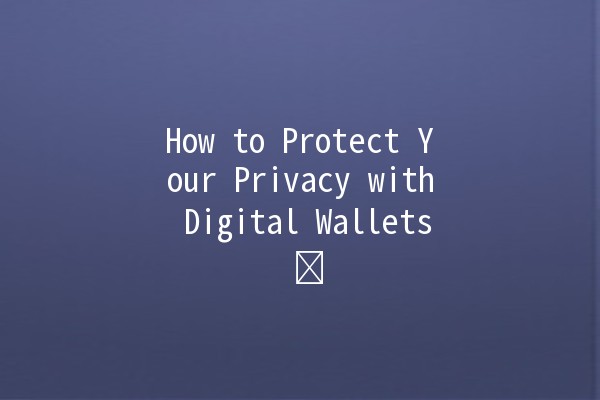
The rise of digital wallets has transformed the way we handle our finances. As these tools allow users to store their money, make payments, and manage transactions, ensuring privacy becomes paramount. With increasing concerns about data breaches and financial fraud, awareness in privacy protection when using digital wallets has never been more crucial. This article explores practical strategies to enhance your privacy while using digital wallets, backed by best practices for securing sensitive information and transactions.
Understanding Digital Wallets
Digital wallets, also known as ewallets, are applications or devices that enable users to store and manage their payment information, such as credit and debit cards, and cryptocurrencies. They facilitate transactions online and instore without the need for physical cash or cards. While their convenience is undeniable, users must ensure their sensitive information remains secure.
Key Features of Digital Wallets

Potential Privacy Risks
Understanding these risks is the first step toward protecting your privacy. Below are actionable tips to enhance your security.
Practical Tips for Enhancing Privacy with Digital Wallets
Explanation: Implementing strong authentication methods such as twofactor authentication (2FA) or biometric security greatly enhances protection against unauthorized access.
Practical Application: Most digital wallets allow for various authentication methods. For example, enable 2FA by linking your wallet to your mobile number or use your device’s fingerprint sensor. This additional layer ensures that even if someone obtains your password, they cannot access your wallet without the second authentication factor.
Explanation: Keeping your digital wallet app and device software up to date ensures that you benefit from the latest security patches.
Practical Application: Enable automatic updates on your device if available. Regularly check for updates to your wallet app to ensure all security vulnerabilities are patched. Furthermore, make sure that your operating system is updated to the latest version to enhance overall security.
Explanation: Knowledge of privacy policies helps users understand how their data is collected, used, and shared by the wallet providers.
Practical Application: Before downloading or using any digital wallet, read its privacy policy meticulously. Look for clear statements about data sharing practices, especially with third parties. Opt for wallets that offer transparency regarding your data rights and usage.
Explanation: Users should share only necessary information when setting up their accounts.
Practical Application: Create a wallet account using only essential details. Avoid providing unnecessary personal information that isn’t required for verification or functionality. For example, some wallets may request access to your contacts or location but assess whether this is truly essential for your usage.
Explanation: Using public WiFi can expose your transaction data to hackers who may intercept your information.
Practical Application: Avoid accessing your digital wallet through public WiFi networks. If you must use them, consider utilizing a virtual private network (VPN) to encrypt your data. A reliable VPN will help protect your information from prying eyes.
Explanation: Regular transaction monitoring helps in quickly identifying unauthorized activities.
Practical Application: Most digital wallets provide transaction history. Make it a habit to check this history frequently. If you notice any unfamiliar transactions, report them to your wallet provider immediately to resolve potential fraud quickly.
Common Concerns about Digital Wallet Privacy
Digital wallets employ various technologies, such as encryption, to secure users' data. However, it is essential to choose wallets with robust security features, such as 2FA and endtoend encryption. Regular monitoring and maintenance of security measures will ensure your data remains secure.
If you suspect any fraudulent activity, immediately change your password and logout of all devices. Report the incident to your wallet provider. They usually have protocols in place to assist you in resecuring your account and potentially recovering losses.
Generally, wallet providers can access aggregated transaction data to help improve their services. However, individual transaction details should remain confidential. Review your wallet’s privacy policy for specifics regarding data access and usage.
While traveling, use a reliable VPN, ensure your wallet app is up to date, and avoid public WiFi where possible. Also, keep your devices secure with a strong password and biometric features.
If your device is lost or stolen, immediately use a web interface (if available) to lock or disable your wallet. Additionally, notify your wallet provider to monitor any unusual activity while you resecure access.
While many users link multiple accounts for convenience, it may increase risk exposure. Consider linking only necessary accounts, and maintain a minimal balance in your digital wallet to limit potential loss in case of a security breach.
Using digital wallets offers remarkable convenience, but protecting your privacy is crucial for a safe experience. By implementing strong authentication, keeping software updated, understanding privacy policies, sharing minimal personal information, avoiding public WiFi, and monitoring your transactions regularly, you can greatly enhance your privacy while enjoying the benefits of digital transactions. Remember, your financial security is in your hands, so take the necessary steps today to safeguard your information and embrace the new way of managing your finances with confidence.

